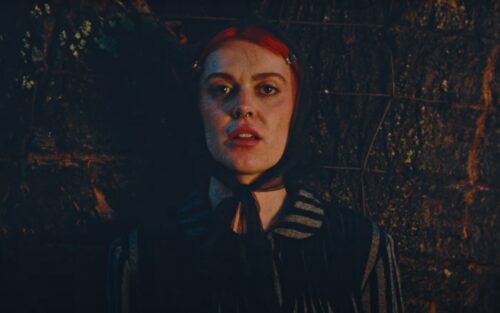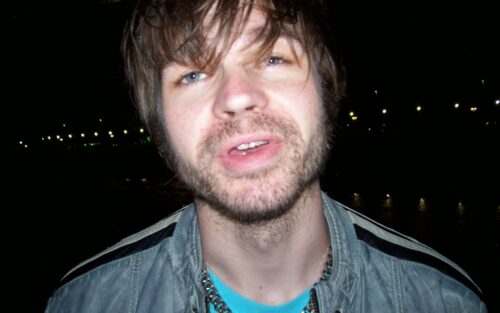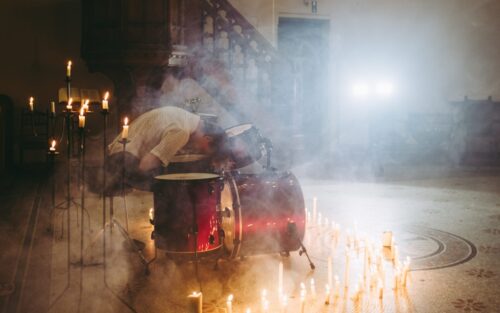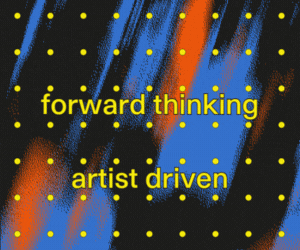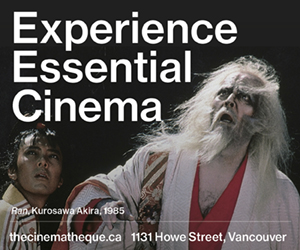MUTEK Festival Turns 25
A mecca for electronic music, DJing, and immersive shows — we take a look back at the origins of a festival that paved the way for the Montreal we now know and love.
By Madeline Lines
- Published on
I climb the stairs of the Société Des Arts Technologiques [SAT] on a sunny morning to meet Mongeau and chat about the festival’s past and present. I wind past exhibits and arts spaces in the airy building that has been home to many legendary MUTEK shows, but has only recently become home to MUTEK HQ. Upstairs, the team buzzes in an open concept office in preparation for the milestone edition, which is coming at them fast – the festival runs in mid-late August.
MUTEK began in 2000 as a natural extension of Mongeau’s previous work managing the new media division of the Montréal International Festival of New Cinema. Inspired by experimentations in computer visuals and sound that were groundbreaking at the time, he wanted to make a festival dedicated to this new art. While it’s easy to take Montreal’s current identity as a hub for electronic music for granted now, it wasn’t always that way, Mongeau tells me.

Nicolas Jaar performing at MUTEK in 2010.
“I felt Montreal was quite apart from where things were happening, which was much more in Europe. I stayed here because I had a child,” says Mongeau. “I decided, okay, if I can’t move, I might as well try to do something to connect in our own way with what’s happening over there. The idea was to bring artists from abroad and start to create a culture here, a scene.”
The first ever MUTEK was small, but exciting. Mongeau recalls how even when the festival ended, people didn’t want to stop. Makeshift performances and after parties materialized out of the sheer excitement of being on the precipice of something new.
One misconception or assumption about MUTEK is that it’s all DJ sets – but from the beginning to now, the fest prioritizes live and original music. Not long after that first edition, new offshoots sprouted up across the globe – and there are now iterations of MUTEK in Mexico City, Barcelona, Tokyo, and Buenos Aires.
“It wasn’t us trying to expand,” says Mongeau. “It was more people coming here, liking what their experience was, and wanting to bring it back and to transplant it somehow in their own context.”

Flying Lotus performing at MUTEK in 2008.
Over the years, institutions like MUTEK have helped Montreal evolve from being seen as a “pit stop” on the way to Europe to a destination in itself. Mongeau says that over 50% of festival attendees are from out of town, and that people come a long way to experience the intermingling of electronic art and the city. But more people than ever are seeing Montreal as a worthy place to build an electronic music career. The city is notorious for being a DJ-making machine, and the summer-long Piknic Électronik festival has become a signature.
“A lot of people that don’t know about electronic music decide either they don’t like it or they’re afraid, they’re afraid to look stupid,” says Mongeau. “So that’s something we’re always trying to work against, to create as many points of entry and discovery as possible.”
One of the ways the fest has evolved is by moving to more outdoor shows that catch wanderers-by, opening up the experience that was previously confined to indoor spaces like MTELUS (or as many still call it, Metropolis).
“There was a moment where it actually felt like we took the Metropolis audience and picked them up and put them out in the open,” says Mongeau. “It’s funny when you take the walls off what happens.”

In the same spirit, the 25th edition includes an exciting new venture. In addition to the “festival” and “forum” parts of MUTEK, there will now be a third section of the fest. The new project’s working title is the “Digital Village,” encompassing 20 to 25 digital art installations in public spaces across the city. The project will bookend the festival, beginning a week before the official start and sticking around for a week after it ends.
It’s just one more way MUTEK is branching out across the city, finding more ways to become a symbiotic part of the artistic ecosystem that you can stumble into. Looking ahead to the next 25 years, Mongeau foresees the festival having more of a year-round presence in the city, where it becomes even more unexpectedly enmeshed than ever before.
When I ask Mongeau about one of his fondest memories of the festival, he tells me about one night at Place Des Arts. He was sitting very high in the back, watching a show, and the person next to him recognized him and tapped him on the back. She told him that when she was a tourist in Montreal a few years ago, she stumbled into MUTEK without having any idea what it was. She said that it “changed her life” and set her down a path of becoming an artist. “That kind of illustrates what MUTEK can do to you,” says Mongeau.
MUTEK 2024 runs Aug 20 to 25 | TICKETS & INFO


By Stephan Boissonneault
Nate Amos revisits a decade of stray ideas and turns them into his most compelling record yet.
By Khagan Aslanov
Mike Wallace’s electro-punk project premieres the hypnotic, percussion-driven video for "Certain Days."

